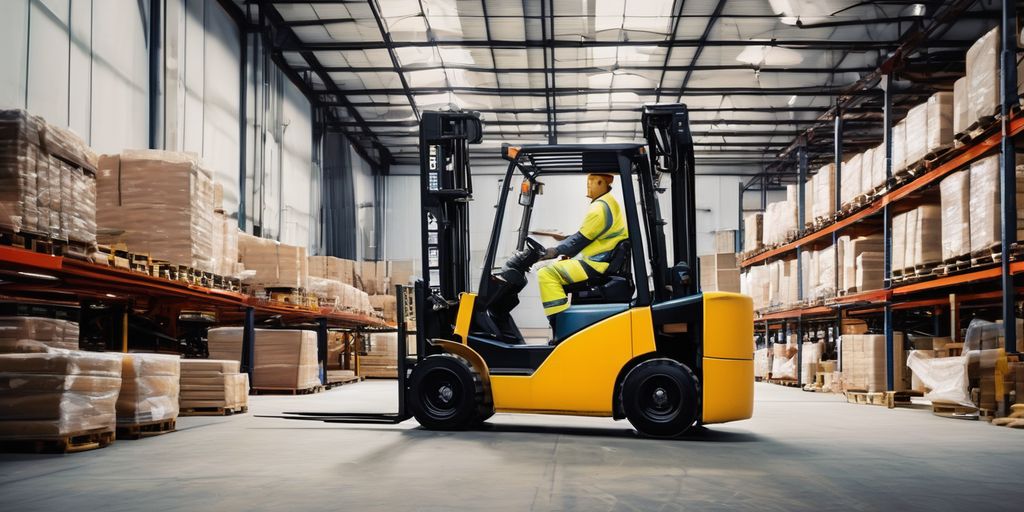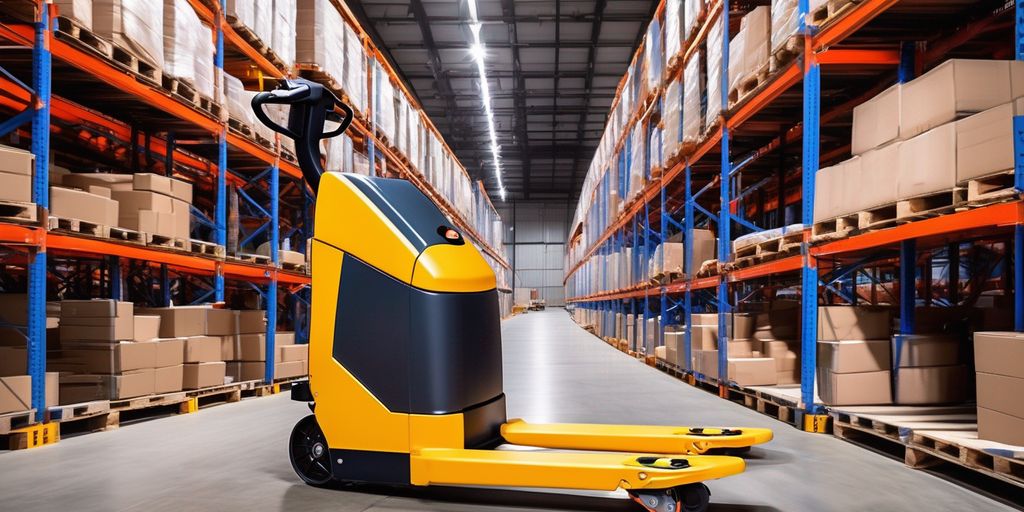Al igual que los chequeos médicos regulares, el mantenimiento preventivo contribuye en gran medida a mantener sus montacargas en óptimas condiciones. Las inspecciones periódicas de montacargas pueden ayudarlo a identificar componentes desgastados o dañados antes de que se vuelvan críticos, lo que le permitirá ahorrar tiempo y dinero a largo plazo. Al programar inspecciones periódicas, puede detectar cualquier problema desde el principio, garantizando que sus carretillas elevadoras estén en óptimas condiciones en todo momento. Este artículo profundiza en los numerosos beneficios de las inspecciones periódicas de montacargas, destacando cómo contribuyen a la seguridad, el ahorro de costos, el rendimiento y más.
Conclusiones clave
- Las inspecciones periódicas de montacargas mejoran la seguridad al identificar peligros potenciales y garantizar el cumplimiento de las normas de seguridad.
- El mantenimiento preventivo ayuda a evitar reparaciones importantes, prolongar la vida útil del equipo y reducir el tiempo de inactividad, lo que genera importantes ahorros de costos.
- Las inspecciones constantes mejoran el rendimiento del montacargas, asegurando una funcionalidad óptima, mayor productividad y un rendimiento constante.
- Los componentes clave que se deben inspeccionar periódicamente incluyen sistemas hidráulicos, frenos y neumáticos, y componentes eléctricos.
- Los acuerdos de mantenimiento planificado ofrecen inspecciones programadas, planes de mantenimiento personalizados y beneficios de costos a largo plazo.
Medidas de seguridad mejoradas

Las inspecciones periódicas de las carretillas elevadoras desempeñan un papel fundamental a la hora de mejorar las medidas de seguridad en entornos industriales. La seguridad siempre debe ser una prioridad máxima en cualquier lugar de trabajo, y las comprobaciones de mantenimiento constantes son esenciales para lograr este objetivo.
Ahorro de costos mediante mantenimiento preventivo
Descuidar el mantenimiento puede ahorrar tiempo y dinero a corto plazo, pero suele generar gastos más importantes en el futuro. El mantenimiento preventivo ayuda a prolongar la vida útil del equipo, lo que reduce la necesidad de reemplazos prematuros. Además, identificar y abordar problemas menores antes de que se conviertan en problemas mayores puede evitar averías y reparaciones costosas .
El mantenimiento regular puede ahorrarle dinero a largo plazo al ayudar a evitar reparaciones o reemplazos costosos debido a averías o mal funcionamiento inesperados. El mantenimiento preventivo proactivo puede ayudar a identificar pequeños problemas antes de que se vuelvan más grandes, ahorrándole tiempo y dinero en reparaciones o reemplazos.
- Verificando los niveles de fluidos
- Inspeccionando correas y mangueras
- Probando los niveles de batería
- Inspeccionando hidráulicos y sellos
El mantenimiento le ayuda a evitar reparaciones costosas al abordar los problemas antes de que se vuelvan importantes. Reparar problemas menores cuesta menos que problemas mayores. Además, cuando soluciona problemas menores a medida que surgen, evita averías inesperadas. Las averías inesperadas provocan reparaciones de emergencia y paradas de producción, que cuestan más que el mantenimiento preventivo.
El mantenimiento preventivo de montacargas consiste en priorizar la seguridad, la longevidad y el ahorro de costos.
Mejora del rendimiento de la carretilla elevadora
Las inspecciones periódicas de los montacargas son cruciales para mantener una funcionalidad óptima. Al garantizar que todos los componentes estén en buen estado de funcionamiento, los montacargas pueden funcionar de la mejor manera, lo que genera una mayor productividad y un rendimiento constante.
Funcionalidad Óptima
Productividad incrementada
Una carretilla elevadora en buen estado funciona de manera más eficiente. Esto puede llevar a lo siguiente:
- Reducir los costos de combustible
- Menor consumo de energía
- Huella de carbono reducida
Rendimiento Consistente
Las tareas de mantenimiento que mantienen los montacargas funcionando a niveles máximos de rendimiento incluyen: lubricación, inspección de los sistemas hidráulicos y garantizar que los frenos y neumáticos estén en buenas condiciones.
El mantenimiento adecuado implica inspecciones periódicas de componentes clave como frenos, neumáticos, sistemas hidráulicos y mecanismos de elevación. Seguir un programa de mantenimiento ayuda a evitar averías inesperadas y garantiza que la carretilla elevadora esté siempre lista para su uso.
Componentes clave para inspeccionar regularmente
Las inspecciones periódicas son fundamentales para mantener la seguridad y la eficiencia de las carretillas elevadoras. El cumplimiento de una lista de verificación de mantenimiento preventivo para carretillas elevadoras garantiza que todos los componentes clave estén en óptimas condiciones, lo que reduce el riesgo de accidentes y reparaciones costosas.
El papel de los acuerdos de mantenimiento planificado
Inspecciones Programadas
Un contrato de mantenimiento planificado es un plan de mantenimiento personalizable que incluye visitas de servicio periódicas para sus montacargas. Estos contratos se adaptan a sus necesidades y uso específicos, teniendo en cuenta factores como el tipo de montacargas, las horas de funcionamiento y el entorno. Mantenerse al día con las visitas de mantenimiento preventivo también ayuda a mejorar la seguridad en el lugar de trabajo. Las inspecciones y el mantenimiento periódicos garantizan que sus montacargas cumplan con las normas de seguridad y que sus empleados puedan operarlos de forma segura.
Planes de Mantenimiento Personalizados
El mantenimiento planificado, también conocido como mantenimiento preventivo, es la única forma de mantener sus montacargas y otros equipos en buenas condiciones. Implica inspecciones, mantenimiento y reparaciones de rutina para poder abordar problemas potenciales y menores antes de que se vuelvan importantes. Abordar los problemas de manera temprana garantiza que sus montacargas sigan funcionando correctamente y duren tanto como deberían.
Los beneficios del mantenimiento planificado incluyen mayor seguridad, confiabilidad, rentabilidad y cumplimiento de las regulaciones.
Beneficios de costo a largo plazo
Para equipos nuevos, cumplir con el programa de mantenimiento recomendado por el fabricante suele ser un requisito para mantener válida la garantía. El incumplimiento del mantenimiento prescrito puede dar como resultado la anulación de la garantía, dejándolo responsable de los costos de reparación que de otro modo habrían estado cubiertos. Al invertir en mantenimiento de rutina, las empresas pueden disfrutar de la ventaja del servicio y mantenerse a la vanguardia en el competitivo panorama industrial actual.
Evitando Accidentes Costosos
Detección temprana de problemas
Las inspecciones periódicas de las carretillas elevadoras son fundamentales para la detección temprana de problemas . Al identificar los componentes desgastados o dañados antes de que se vuelvan críticos, puede ahorrar tiempo y dinero. Este enfoque proactivo ayuda a abordar problemas menores antes de que se conviertan en problemas mayores, lo que evita averías inesperadas y reparaciones costosas.
Prevención de fallos en el equipo
El mantenimiento le ayuda a evitar reparaciones costosas al abordar los problemas antes de que se vuelvan importantes. Reparar problemas menores cuesta menos que problemas mayores. Además, cuando soluciona problemas menores a medida que surgen, evita averías inesperadas. Las averías inesperadas dan lugar a reparaciones de emergencia y paradas de producción, que cuestan más que el mantenimiento preventivo.
Minimizar Incidentes en el Lugar de Trabajo
Mientras hablamos de gastos, no olvidemos el daño potencial que un montacargas defectuoso podría causar a su edificio o a los costosos productos que transporta. Un solo percance puede provocar daños en los productos, retrasos en la entrega e incluso dañar la reputación de su empresa.
Las inspecciones periódicas de montacargas ayudan a garantizar que su equipo esté a la altura de la tarea, protegiendo sus resultados y manteniendo contentos a sus clientes.
Beneficios ambientales del mantenimiento regular
Reducción de Emisiones
El mantenimiento periódico de las carretillas elevadoras desempeña un papel fundamental en la reducción de emisiones. Al garantizar que los motores y otros componentes funcionen de forma óptima, las carretillas elevadoras pueden funcionar de forma más eficiente, lo que se traduce en menores emisiones. Esto no solo ayuda a minimizar la huella de carbono , sino que también contribuye a un entorno de trabajo más saludable.
Uso Eficiente de Combustible
El mantenimiento periódico de las carretillas elevadoras garantiza que utilicen el combustible de manera más eficiente. Los motores y los sistemas hidráulicos bien mantenidos consumen menos combustible, lo que se traduce en ahorros de costos y menor impacto ambiental. El uso eficiente del combustible es un resultado directo de prácticas de mantenimiento proactivas .
Eliminación adecuada de residuos
El mantenimiento regular incluye la eliminación adecuada de materiales de desecho, como aceites usados, filtros y otros componentes. Esta práctica asegura que los materiales peligrosos se manipulen correctamente, evitando la contaminación ambiental. La eliminación adecuada de residuos es un aspecto esencial del mantenimiento responsable de las carretillas elevadoras.
El mantenimiento regular no se trata sólo de mantener los montacargas funcionando sin problemas; también se trata de ser ambientalmente responsable. Al reducir las emisiones, garantizar el uso eficiente del combustible y eliminar adecuadamente los residuos, las empresas pueden generar un impacto positivo significativo en el medio ambiente.
Conclusión
En conclusión, las inspecciones periódicas de los montacargas y el mantenimiento preventivo son prácticas esenciales que ofrecen numerosos beneficios. Al igual que los controles médicos regulares, estas inspecciones ayudan a identificar y abordar problemas potenciales antes de que se conviertan en reparaciones costosas o accidentes peligrosos. Al mantener un programa de inspección constante, puede garantizar que sus montacargas permanezcan en condiciones óptimas, mejorando la seguridad, confiabilidad y eficiencia en sus operaciones. Este enfoque proactivo no sólo ahorra dinero al evitar costosas averías y minimizar el tiempo de inactividad, sino que también prolonga la vida útil de su equipo. Dar prioridad al mantenimiento regular de las carretillas elevadoras es una inversión inteligente que protege tanto a su fuerza laboral como a sus resultados finales.
Preguntas frecuentes
¿Cuáles son los beneficios de las inspecciones periódicas de montacargas?
Las inspecciones periódicas de montacargas ayudan a identificar componentes desgastados o dañados antes de que se vuelvan críticos, ahorrando tiempo y dinero. También garantizan que las carretillas elevadoras estén en óptimas condiciones, mejorando la seguridad y el cumplimiento de las normas de seguridad.
¿Cómo ahorra dinero el mantenimiento preventivo?
El mantenimiento preventivo ahorra dinero al evitar reparaciones importantes, extender la vida útil del equipo y reducir el tiempo de inactividad. Los controles periódicos pueden prevenir problemas futuros y garantizar que las carretillas elevadoras duren más.
¿Qué componentes clave deben inspeccionarse periódicamente?
Los componentes clave que deben inspeccionarse periódicamente incluyen sistemas hidráulicos, frenos y neumáticos, y componentes eléctricos. Las inspecciones periódicas de estas piezas garantizan una funcionalidad y seguridad óptimas.
¿Qué papel juegan los acuerdos de mantenimiento planificado?
Los acuerdos de mantenimiento planificado implican inspecciones programadas y planes de mantenimiento personalizados, lo que proporciona beneficios de costos a largo plazo. Garantizan que las carretillas elevadoras reciban servicio y mantenimiento con regularidad, evitando averías costosas.
¿Cómo mejora el mantenimiento regular el rendimiento del montacargas?
El mantenimiento regular mejora el rendimiento del montacargas al garantizar una funcionalidad óptima, aumentar la productividad y mantener un rendimiento constante. Los montacargas bien mantenidos tienen menos probabilidades de fallar, lo que permite operaciones más fluidas.
¿Existen beneficios medioambientales en el mantenimiento regular de los montacargas?
Sí, el mantenimiento regular de las carretillas elevadoras tiene beneficios medioambientales, como la reducción de emisiones, la garantía del uso eficiente del combustible y la eliminación adecuada de los residuos. Estas prácticas contribuyen a una operación más ecológica y sostenible.




Deja un comentario
Este sitio está protegido por hCaptcha y se aplican la Política de privacidad de hCaptcha y los Términos del servicio.